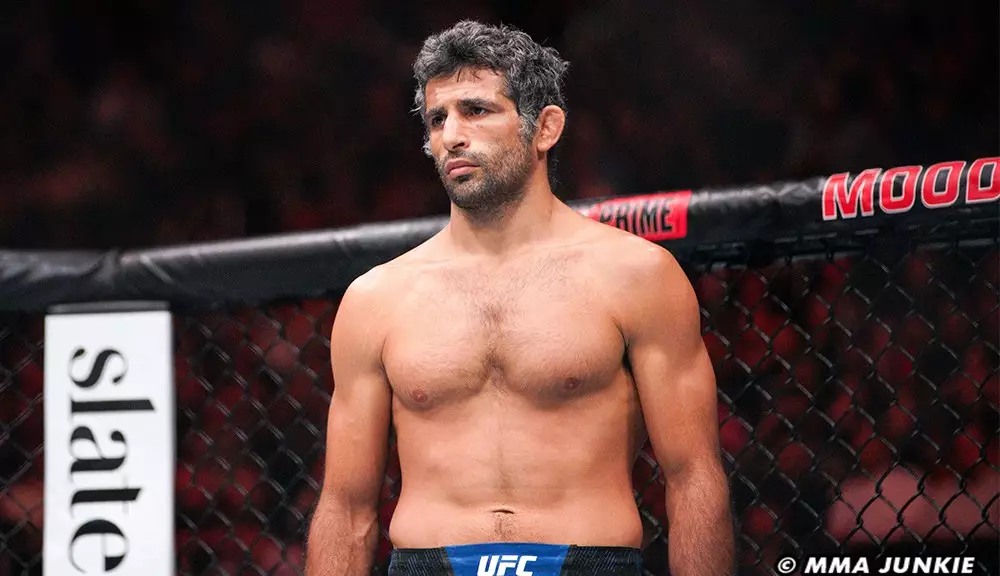Beneil Dariush finds himself at a significant juncture in his mixed martial arts career as he prepares for his fight against Renato Moicano at UFC 311. The stakes are high for Dariush, who has not emerged victorious since October 2022, facing a daunting two-fight losing streak. This upcoming bout, scheduled for January 18 at the Intuit Dome in Inglewood, California, represents not only a chance for redemption but also a critical evaluation of his future in the sport. Dariush’s perspective on this fight is both introspective and revealing, indicating that much more than just a win or loss is on the line.
With nearly 11 years under the UFC banner, Dariush has carved out a reputation as a formidable lightweight competitor. However, his recent performances—marked by first-round knockout losses to Arman Tsarukyan and Charles Oliveira—have raised questions about his trajectory in the sport. At 35 years old, he stands at a crossroads that many athletes face: continued competition or an introspective evaluation of one’s role in the octagon. Dariush’s candid insights surrounding retirement reflect a complex mindset that encompasses both physical and emotional readiness.
Dariush’s reflections echo a common theme in sports: the dichotomy of desire and ability. He articulates his unwavering passion for the sport and acknowledges his ongoing commitment to improvement. “Do I have the desire? Do I have the ability?” he queries, suggesting that these questions loom larger than any single fight outcome. His insistence on feeling capable and ready speaks volumes about his mental state. Moreover, Dariush stresses the importance of being able to demonstrate his growth; it’s not sufficient to feel good—he must actualize this capability in the octagon.
Entering UFC 311, Dariush will have been away from active competition for over 13 months. This elongated hiatus can often be seen as a detriment, yet Dariush perceives it as an opportunity for rejuvenation. He claims this is the best physical condition he’s ever been in, a statement that bears both confidence and the weight of expectation. Anticipation wrestles against caution, and Dariush’s excitement about returning to fight against a high-caliber opponent like Moicano fuels his competitive spirit. This match presents not merely a battle but also a chance for Dariush to reclaim his narrative within the sport.
Dariush acknowledges that he comes into this fight as a betting underdog against Moicano, a position he accepts without bitterness. Rather than viewing this as a detriment, he channels it into motivation. It reflects the reality of momentum in sports—Moicano is currently climbing ranks while Dariush seeks to reignite his career. “What version of Dariush are you going to get?” he asks, which encapsulates the pivotal nature of the fight: it’s not only about defeating Moicano; it’s about proving to himself and the world that he remains a contender capable of championship aspirations.
The outcome of this fight will likely dictate Dariush’s future in mixed martial arts. A victory could reinstate his status among the elite, while a loss might signal the time to contemplate retirement. However, Dariush remains focused on the immediate task—returning to form and demonstrating his worth. He respects long-tenured fighters, but contrasts their paths with his own quest for championship gold. His clarity regarding retirement, conditional on his ability to compete at the highest level, showcases his commitment not just to the sport but to his personal legacy.
As Beneil Dariush prepares for UFC 311, he stands at an intersecting path where passion meets reality. This fight is more than just a number on his record; it is a reckoning of what he has achieved, what he has learned, and what he still hopes to accomplish. In a sport that thrives on the dichotomy of triumph and defeat, Dariush’s journey is a compelling reminder of the human elements at play—desire, ability, introspection, and the relentless quest for greatness.

